Interns from Kazakhstan's aid agency KazAID: Partnership to build the future of Central Asia

2025.07.07
-

- East and Central Asia and the Caucasus Department Aiko Hayashi
We welcomed two interns from KazAID, an organization recently established in Kazakhstan, a country experiencing rapid economic growth, to explore new opportunities for cooperation with Japan through activities at JICA headquarters and visits to local regions.
Kazakhstan Agency of International Development (KazAID) was established in December 2020 as an organization under the Ministry of Foreign Affairs of the Republic of Kazakhstan, a country with abundant natural resources and remarkable economic growth in recent years.
Kazakhstan's ODA aims to support regional issue resolution for regional peace, stability, and sustainable development, primarily in Central Asian countries and Afghanistan. JICA endorses this initiative and has supported the establishment of KazAID through country-specific training and technical cooperation projects since the country's "ODA law" was enacted in 2014. After its establishment, JICA concluded a MOC with KazAID in December 2022, and since then, through the dispatch of technical cooperation experts, JICA has been working to strengthen its organizational capacity, institutional development, and staff capacity to ensure the smooth implementation of ODA. Furthermore, JICA also cooperates with KazAID in cooperation with neighboring countries.
While Kazakhstan's ODA has increased from USD 8 million in 2013 to USD 36.86 million in 2022, KazAID has only 17 staff members as of 2024. The lack of operational capacity and cooperation know-how as an ODA implementing agency is an organizational challenge.
In response to KazAID’s request to learn about the overall process of ODA implementation, including project formulation, implementation supervision, and project evaluation at JICA Headquarters, two KazAID staff members were accepted as "interns" at the Central Asia and the Caucasus Division of the East and Central Asia and the Caucasus Department and the Private Sector Development Group of the Economic Development Department from March 3 to 14, 2025.
At the headquarters, while communicating with staffs engaged in regular duties, they attended meetings with UN agencies for the formation of projects, internal JICA review meetings and discussions, and briefings by various JICA departments. Questions and opinions were actively exchanged at every turn.
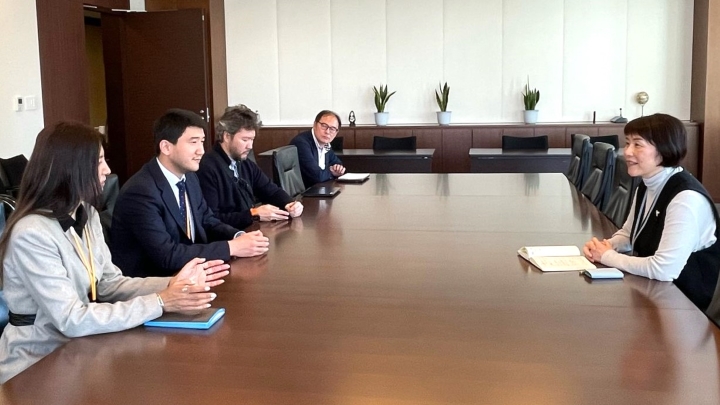
Courtesy call to Senior Vice President Imoto
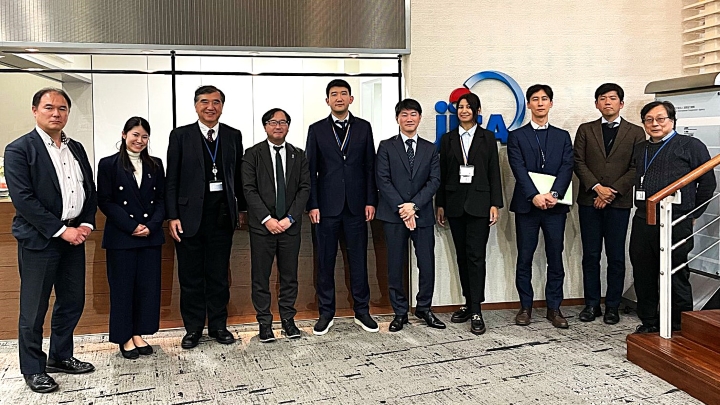
Discussions with the United Nations Development Programme (UNDP), JICA's Global Environment Department, and the East and Central Asia and the Caucasus Department.
We also visited Niigata Prefecture to see the activity of Mr. Mitsuo Murayama, a JICA expert working in the field of business promotion in Kazakhstan.
With snow-capped mountains passing through the train’s window, we first landed in Nagaoka City. Now famous for its fireworks, this area was severely damaged by the 2004 Niigata Chuetsu Earthquake, which claimed many precious lives.
Mr. Takeshi Kawauchi of The Chuetsu Organization for Safe and Secure Society (COSSS), a public interest incorporated association established as a result of this earthquake, gave them a lecture on the experiences and lessons learned from the Niigata Chuetsu Earthquake, and valuable insights into the concepts of self-help and mutual aid, and building a network of citizen volunteers.
Like Japan, Central Asia is at risk of earthquake disasters, and in recent years people's sense of crisis and interest in disaster prevention have been growing. The interns showed great interest in this topic, saying, "We would like to disseminate what we have learned today not only in Kazakhstan but also in other countries in Central Asia. Coincidentally, our visit took place on March 11, which is the day when the Tohoku Earthquake occurred in 2011. It was an opportunity for us to think about what we can do to save as many lives as possible from the disasters in Japan and around the world.
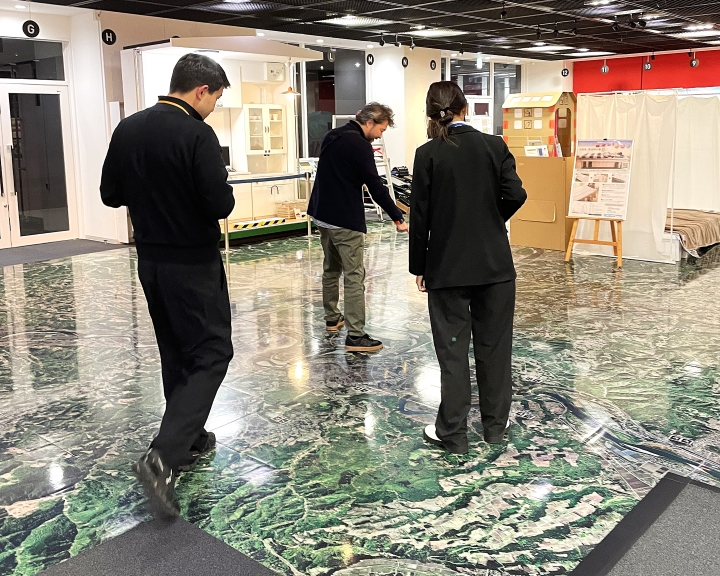
Tour of Disaster Prevention Facilities in Nagaoka City
After Nagaoka City, we moved on to Niigata City. There, Mr. Fumi Nakamura, Research Manager at Niigata University and former JICA Niigata Desk officer, spoke about the challenges faced by Niigata Prefecture in its international relations, and how these challenges are being addressed in cooperation with JICA. The interns quickly proposed ideas for cooperating with "Niigata University× Agriculture× Kazakhstan" and I was able to sense their positive attitude and dynamism firsthand.
The final destination of the visit was the “Niigata Keizai Doyukai” (Niigata Association of Corporate Executives.) The association is planning business missions for Niigata companies to foreign countries. They plan to visit Kazakhstan and Uzbekistan in FY2025. To help participating companies become familiar with each country, JICA expert Mr. Murayama gave a lecture on Kazakhstan, explaining its profile and why it is an attractive investment destination. The association's members commented that "Kazakhstan and Uzbekistan are both potential markets with high economic growth rates. Both countries have a strong interest in cooperating with overseas companies, including Japanese, so we are glad that we chose them as mission destinations.” The exchange of opinions between the interns and association members indicated the potential of economic interaction between Niigata Prefecture and Kazakhstan.
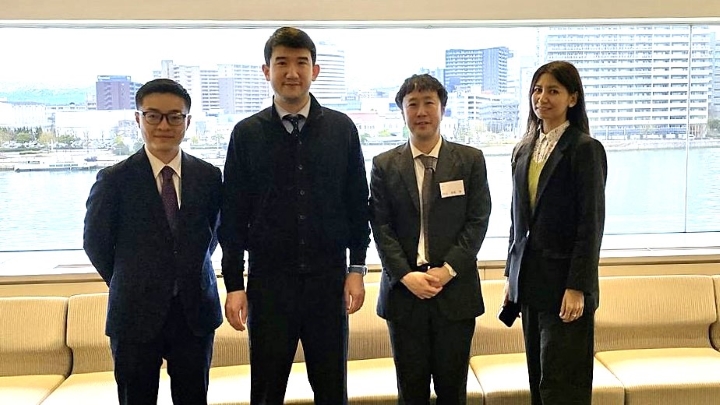
At the “Niigata Keizai Doyukai” meeting. (From right to left: Ms. Ainur of KazAID, Mr. Murayama, JICA expert, Mr. Alisher of KazAID, Mr. Okoshi of Economic Development Department)
JICA is promoting regional cooperation in Central Asia with Kazakhstan as an equal partner. Japan's history of receiving aid and expanding its ODA alongside postwar economic growth is similar to Kazakhstan's current situation, so I thought it would be useful for KazAID's development. Through this program, we also recognized the importance of involving diverse actors in international aid and the common issue of improving public understanding of aid to developing countries, and I believe that we gained new perspectives for future cooperation with JICA.
To conclude, I'd like to share a message that was received from two of the interns.
Development is not just about economic growth, but about striking a balance between sustainability, innovation, and equal opportunities. By bringing together knowledge, expertise, and a commitment to progress, JICA plays a vital role in shaping a future where nations do not compete but support each By bringing together knowledge, expertise, and a commitment to progress, JICA plays a vital role in shaping a future where nations do not compete but support each other's growth.
The internship allowed us to see the importance of collective efforts in addressing global and regional challenges. We realized that partnerships between countries are not just about diplomacy but serve as a mechanism that enables meaningful change.
Despite today's world of rapid change and increasingly complex challenges, JICA remains steadfast in its mission to strengthen ties between nations, support sustainable development initiatives and create new opportunities for future generations. This approach is inspiring, proving that progress is impossible without dialogue, trust and collective problem-solving. This approach is inspiring, proving that progress is impossible without dialogue, trust and collective problem-solving.
It has not only broadened our understanding of international development, but also strengthened our belief that positive change begins with collective effort. May this journey continue, opening new horizons for cooperation and sustainable growth.
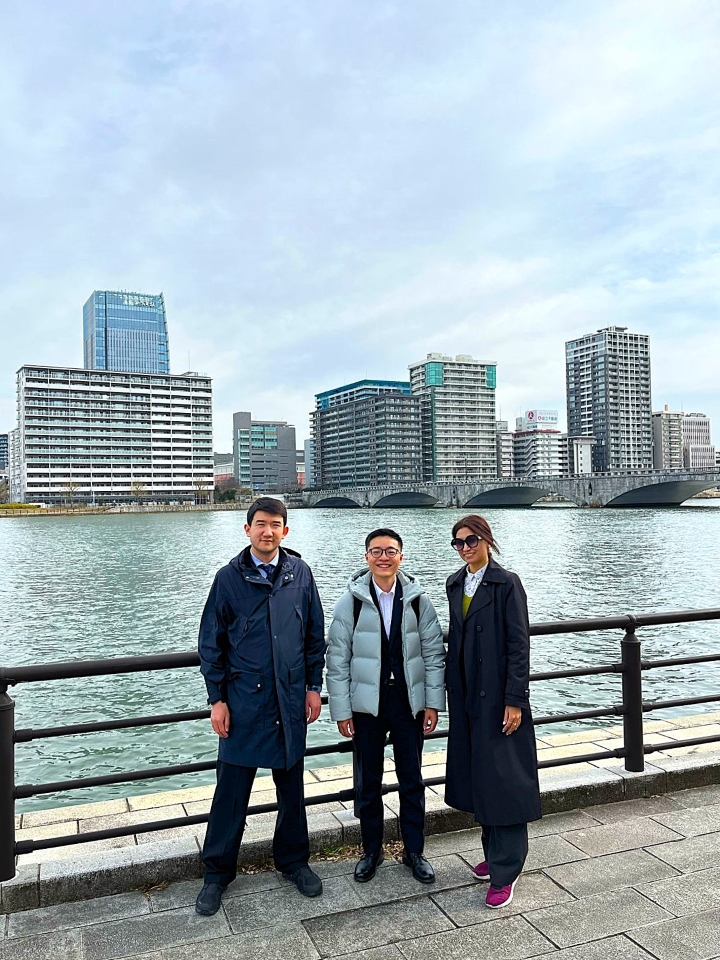
On the banks of the Shinano River.
scroll